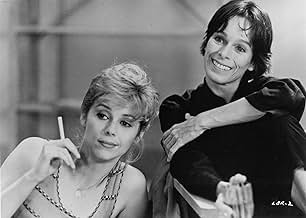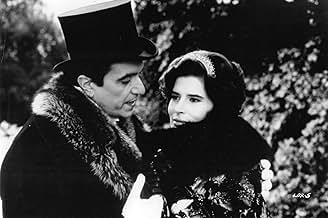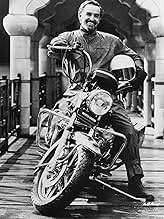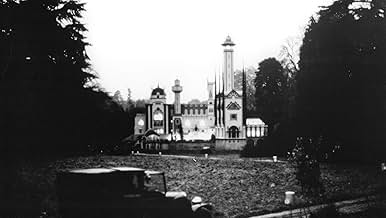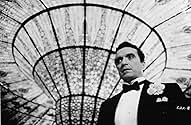La vie est un roman
- 1983
- Tous publics
- 1h 50m
Three intertwined tales. On the eve of the First World War, Count Forbek starts to build a fantastic castle in the Ardennes forest. After the war he uses it to start a utopian society by bra... Read allThree intertwined tales. On the eve of the First World War, Count Forbek starts to build a fantastic castle in the Ardennes forest. After the war he uses it to start a utopian society by brainwashing his friends, including his former fiancee, Livia, and her husband. In the presen... Read allThree intertwined tales. On the eve of the First World War, Count Forbek starts to build a fantastic castle in the Ardennes forest. After the war he uses it to start a utopian society by brainwashing his friends, including his former fiancee, Livia, and her husband. In the present day, the castle is being used as an alternative school and, in the summer holidays, for ... Read all
- Awards
- 3 nominations total
- Director
- Writer
- All cast & crew
- Production, box office & more at IMDbPro
Featured reviews
Fair point. But here's something else.
Resnais broadly speaking loves two things. On one hand theater, movies, architecture, comic-books (he is an avid collector) - so by extension, the color, frill and artifice of appearance. And you can see that in his actual films, almost without exception tuned to musing, fabrication and some form of theatricality.
His primary interest, however, is extending this notion of constructed realities to the deep end of the architecture of self. In simple terms, he attempts to show that what we largely accept as abstract propositions about ourselves (thought, memory) are internally the same fabrication as anything we build in life, governed by exactly the same mechanism.
Cinema is the best medium to inherit the endeavor - not only is every image (as is every thought) staged in the mind's eye, not only does the camera as internal narrator shuffle and slide through successive planes of narrative, but external space (the library in Tout le Histoire, the museum in Hiroshima, the hotel in Marienbad, the capsule in Je t'aime, etc.) mirrors our experience of internal space, the faculties of consciousness.
Add to these the lavish château somewhere in the Ardennes of this film.
There are three overlapping narratives centered on that place. One is romantic myth about the baby son of a king who grows up to slay the dragon and rescue the maiden. The second is about an architect in the 1910's whose plans to build the château and marry his loved one are interrupted by WWI. The third is set in present times, about a conference of intellectuals who convene there to discuss new educational (narrative) principles.
The main narrative thrust across all three is that there is no harmony in the workings of the soul, though we construct artifice to that effect. There is a dialogue of sorts this kicks off within the film. Look at what Resnais does.
All three narratives centered on artifice and ritual. Myth, glassy theatric decor, operatic singing in the first. Miniature model, actual building and ritualized experiment that later takes place there in the second. Another miniature landscape, the conference and romantic plot (which is not spontaneous but manipulated by a third party, artificial) in the third.
And the point repeated across all three is what? But of course the forcible attempt to create harmony, which is to say forcing nature to conform to what the mind thinks it ought to be.
Of the three, only the myth is happily resolved, the obvious product of fabrication.
The architect conducts an experiment that supposedly is going to make everyone happy and in harmony with the world, but all the guests drink the miraculous potion except the love of his life; love cannot be manipulated to happen.
The conference erupts in violent disagreement over the preferred educational method. The romantic thrysts end in unpredictable notes, not at all according to the plan of the woman who has manipulated the plot - played by Geraldine Chaplin, whose father made his cinematic fortunes by peddling artificial harmony and miraculous love.
The point is that there is no harmony outside the stories we devise to attempt it, no single method to navigate the landscape of life. Being interested, alert, spontaneous and involved in its exploration, like the teacher is interested in the miniature landscape laid before the educators, is the only way.
This is good stuff, folks, showing wisdom. It will not immediately win you over, because it's not a rich swim like early Resnais or Tarkovsky. It is whimsical, but not in the confrontational way of Greenaway, a bit chaste. The eye does not move walls of perception around, as in Welles. Unlike Inception, it explains in light ripples.
So be it. I count it next to Draughtsman as among the most intelligent in film.
The film engages interest from the very beginning with the cluster of characters, focusing our attention and intriguing us with striking and interesting dialogue - there are lots are ideas swirling around here. There is humour too -tending to be macabre, but intended to be childish as well.
And so, the film begins in the grounds of a forest in Arden where a strange castle is to be built by an eccentric and wealthy Count. The invited special guests 'coo' together in chorus of astonishment as the model of the fairy tale castle is revealed. The castle is decorated in a mixture of colours with imagination to the exotic and the orient -the design and the colours are inspiring to the imagination:
The story will revolve around the castle in 3 stories of different time zones, but not involving the same characters. Ingeniously, the film moves effortlessly and mysteriously in each time zone. It is like a story within a story, and there seems to be no boundary of time.....from an ancient kingdom that intrigues - like a Shakespearian play that is set in extraordinary colours in the forest.....to a present day that is set 60 years after the castle was built ( with a fleeting and a dreamy reference to WW1, which interrupted the full completion of the castle ).....and then of course back to the first part of the story with the original guests who viewed the model castle and are back again once the castle was completed.....
There is strange music which is significant to enhance the oddness of the story, and outbreaks of singing, which accords to the style of the filming....
To simplify and reveal some of the plot details: The castle was built as a temple to accommodate the guests to live with the Count and be part of an experiment by drinking a potion that will fulfil a rebirth to bring harmony and happiness....
The present day setting of the castle is used as a private and illusive school to educate children in a new wave of development: The Holberg method. Look out for Geraldine Chaplin as she arrives with her daughter in a car that breaks down in the forest leading up to the castle. It is the Forest of Arden as Geraldine gives reference to Shakespeare as she walks off to walk to the castle, and replies to her daughter, 'As You Like It' as her child then joins 3 other children who are playing in the in forest. There are very funny and engaging scenes with the children throughout the film....
Following in the present day, the castle has been reserved to hold a conference for visiting teachers who engage together on The Holberg project of education- the lady teachers speculate on aspects of love, but misjudge the outcome....
The general theme of the film speculates on whether love is a remedy for harmony and happiness - and if a rebirth of the heart of love can materialize into this genre of peace - and can the world be a better place to live without a leader?
There are indeed threads of ideas that fuse all 3 stories together: it is a collage of ideas mixed together with visual art that delights in surreal imagination. The film is directed by Alain Resnais, and is in tribute to 3 other French film makers -Geroges Melies, Marcel L'Herbier, and Eric Rohmer: hence 3 tales absorbingly connected in fascination and mystique.
I guess that if you are going to like the film, you either have to be slightly mad, or be like Salvador Dali? I love the film -it is timeless! I think it is truly a masterpiece of film making - it is astonishing and very interesting. I feel rewarded and refreshed as though I had participated in the film myself!
Also starring Fanny Ardant.... .
Would have been a 4/10 for being maybe tolerable, but with the addition of that arbitrary, inexplicable singing- worst of all, other characters pretending as if no such thing had occurred- a 3/20 is generous.
Alas, my fault. Always trying to give highly commended artists the greatest benefit of the doubt. I want to be proven wrong, that I overlooked something. Did I? Not this time. He should probably stick to Nazi documentaries.
The two utopian experiments are contrasted with a medieval story that seems to comment on the other two stories....In fact, the medieval story is an idealistic view of the world as the children see it. So there are, in fact, three ideals contrasted. This makes for a very complicated structure which you may ignore if you just want to watch the interactions of the characters or listen to the delightful music.
Did you know
- TriviaWhile old fashioned Kodak film was used for the 1910s scenes and legendary period, modern Fuji film was shot for the 1982 storyline, opposing dreamlike effects of the former to realism of the latter.
- ConnectionsFeatured in Legendy mirovogo kino: Fanny Ardant
- How long is Life Is a Bed of Roses?Powered by Alexa
Details
- Release date
- Country of origin
- Languages
- Also known as
- Life Is a Bed of Roses
- Production companies
- See more company credits at IMDbPro
- Runtime
- 1h 50m(110 min)
- Sound mix
- Aspect ratio
- 1.66 : 1

